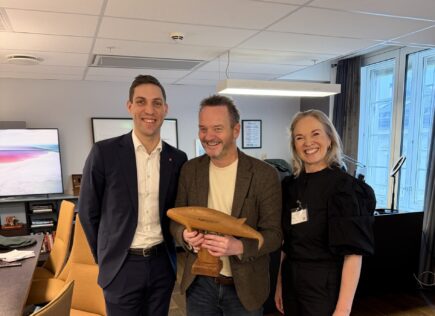At the AquaNor technology fair, Sjømat Norge presented its vision “Aquaculture 2030 – Think globally, act locally”(click to download the document).
It states that the Norwegian aquaculture industry is to represent the world’s most environmentally friendly production of healthy food and that the industry is to provide world-class seafood, production competency and technology. The Norwegian aquaculture industry will represent Norway’s most important contribution to achieving the UN’s Sustainable Development Goals through sustainable production methods and innovation.
Re-thinking required
Five years ago, Sjømat Norge presented a similar plan and the organisation has also coordinated industry efforts over many years to combat fish escape and salmon lice.
“|We have now defined our ambitions more concretely on behalf of our member companies. The work is now underway and will result in a joint strategy for the further sustainable development of the aquaculture industry and how it should be managed by the year 2030. This will require a new way of thinking and change,” stresses Ystmark.
He hopes that the industry, researchers, authorities, environmental organisations and other interested parties will contribute to the process until the final strategy is in place in the spring of 2018. Later this fall, Sjømat Norge will also present a vision document to help the seafood industry and fisheries sector between now and 2030.
Based on UN Sustainable Development Goals
Norge endorses the UN Sustainable Development Goals, on which the goals for the aquaculture industry are based. The vision document presents three goals linked to environmental sustainability and three linked to social and economic sustainability:
- The aquaculture industry will not have a negative impact on biodiversity.
- The aquaculture industry will be part of the solution to climate challenges.
- The aquaculture industry will use the ocean in a manner that promotes environmentally sustainable development.
- The aquaculture industry will contribute to increasing global food production.
- The aquaculture industry will contribute to the positive development of Norwegian society.
- The aquaculture industry will contribute to improving the global living standard.
“This includes, for example, a desire to help maintain the populations of wild salmon, coastal cod and shrimp and, by the year 2030, reduce the footprint of the aquaculture industry. This will require a series of concrete measures – the use of insects, algae and plankton in fish feed, controlling fish escape and lice, energy efficiency, environmentally friendly transport and preventing discharges and emissions from threatening the marine ecosystem.
Another example is tracing escaped fish to the facility responsible for them. Since 2011, more than 50 million NOK have been spent to develop a joint tracking system based on an analysis of DNA and trace elements in farmed fish. The implementation of the system is to start this fall.
In partnership with the UN
“We are very pleased that the UN Environment Programme (UNEP) has announced that it wishes to enter into a partnership with Sjømat Norge in order to help the aquaculture industry achieve the vision laid out in ‘Aquaculture 2030’,” says Ystmark, who looks forward to the collaboration.
He points out that the ambitions place considerable demands on the industry, as well as government management. Studies show that seafood is climate-friendly food, which is why the global community needs to agree on increasing the supply. Being a seafood nation, Norway can play an important role in this.
“Seafood is part of the solution to the need for both food and climate-friendly production. That is why we believe that food-producing sea areas should clearly prioritise fishing and aquaculture operations. In addition, Norway is leading in aquaculture technology and competence and can contribute to more sustainable food production in many other countries by exporting our solutions,” says Ystmark.
Professor Ragnar Tveterås of the University of Stavanger will lead the work on concretising goals and operationalising measures.
“As the biggest and leading seafood organisation, it is our responsibility to set standards and provide direction on behalf of the industry. Our goal is to have the Norwegian aquaculture industry contribute to achieving the UN’s global sustainability goals through local and international measures. We also believe this will benefit numerous local communities here in Norway,” says Ystmark.
Other comments:
CEO Geir Ove Ystmark, ph. +47 481 27 155
Norwegian Seafood Federation (Sjømat Norge)
Vil du lese mer?

Årets #MerAV-seminar med priser
Deltagerne på årets #MerAv-seminar fikk høre siste nytt om utviklingen i de tre varegruppene grove kornprodukter, sjømat...

Tariffkonferansen 2026
Velkommen til den årlige tariffkonferansen som arrangeres av NHO Mat og Drikke og Sjømat Norge. Programmet er...

Klima- og miljøministeren overleverte vandrehvalen til Sjømat Norge
Sjømat Norge har fått overlevert vandrehvalen fra klima- og miljøminister Andreas Bjelland Eriksen – et viktig symbol...